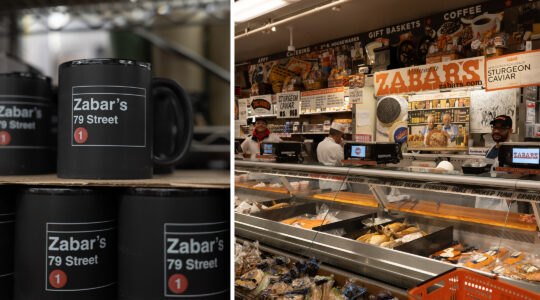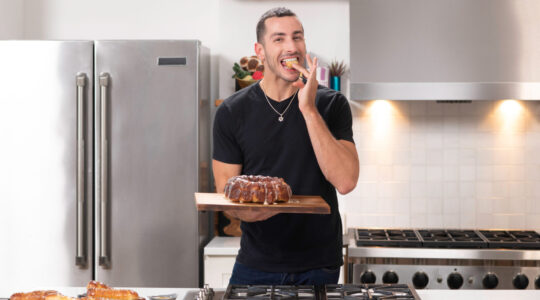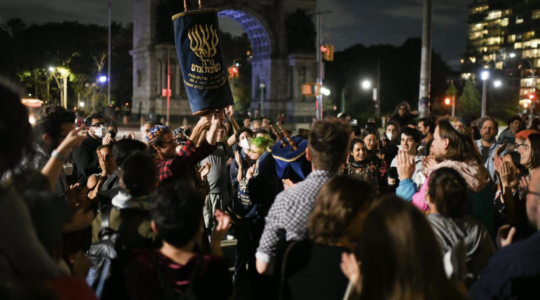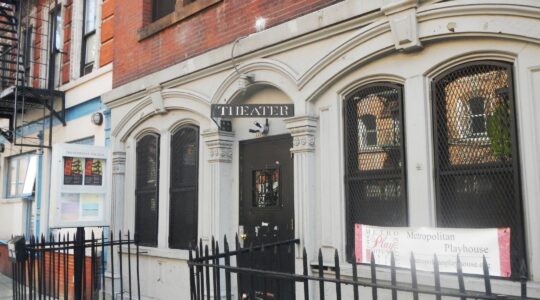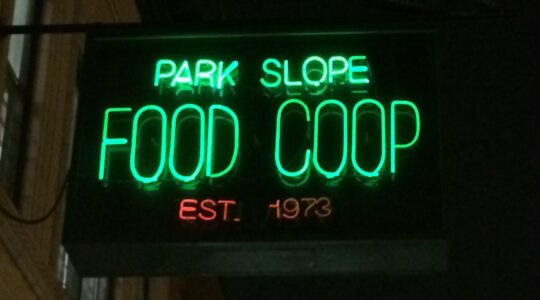Call it the Cool Factor.
Dr. Allison Stakofsky, a pediatric resident, said Jewish singles events pose the threat of being a difficult [read: awkward] experience. Yet she was grateful to be having “Cocktails on The Roof” along with nearly 250 other singles at the Manhattan Jewish Experience on West 86th Street, and there were indeed some prospects.
“You know that there’s a chance that the guys won’t be cool and you’ll end up talking to your friend in the corner,” Stakofsky said. “But I’m looking to meet a nice Jewish boy to take home to my mom, and have to risk it.”
The Manhattan Jewish Experience, known as MJE, is an attractive destination for singles, according to those interviewed.
It helps having young dynamic rabbis, say singles, ones who employ a soft sell. Ones who can show the value of becoming observant without making people feel pressured or making them think that their value lies only in their level of religiosity.
“The [MJE] rabbis are really cool and the opposite of what you might expect,” said Jeff Belsky, a 28-year-old, who teaches Spanish at a public high school in Brooklyn. “It can be very intimidating to come to a new place when you feel like you might have to measure up if you’re not as religious as someone else.
“But the rabbis are young and set a tone that makes you want to come back.”
Rabbi Mark Wildes, 42, the founder and director of MJE, said that if he is in fact cool, it may come from his childhood, when on his eighth birthday, he met John Lennon. His father, Leon was Lennon’s immigration attorney. Wildes became a drummer for a band called Tohu Vavohu, Hebrew for Chaos and Disorder, which is a term some might use to describe the current Jewish dating scene. The teenage Wildes played at events hosted by the Orthodox Union’s youth group NCSY. Finding out there was a class for those who were struggling with their observance, Wildes sat in — and felt he could do a better job of teaching. He said Rabbi Mark Cohen, the regional director of NCSY, approached him with an offer — to lead services at a synagogue in front of hundreds of people.
The experience helped launch his career in the rabbinate (after graduating from Cardozo Law School.) Wildes founded MJE (www.jewishexperience.org) in 1998, and today the organization has branches on East 62nd Street and East 29th Street, as well as its original West 86th Street location. Some 5,000 people have attended its parties, such as this week’s Tel Aviv-themed “Cocktails on the Roof” and the upcoming End of Year Bash on Aug. 23. Along with parties and Sabbath and holiday services, there are classes, ski trips, trips to Israel and speakers on hot topics.
Whatever cool he has, Rabbi Wildes needs all of it to bring young Jews into the fold, given the temptations of modern American society.
“We focus on Jews in their 20s and 30s specifically to combat intermarriage,” he said. “You need to create as many different activities as possible and engage young Jewish people. MJE’s goal is not simply to get Jews to marry Jews. It’s to make a case for Judaism and show why it’s worth pursuing. You can get someone to marry Jewish but if they don’t know why they’re Jewish, all you’ve done is postponed the problem another generation.”
Rabbi Wildes, who was ordained at and teaches an outreach class for rabbis at Yeshiva University, said MJE has helped bring about 80 marriages.
Support the New York Jewish Week
Our nonprofit newsroom depends on readers like you. Make a donation now to support independent Jewish journalism in New York.
When Shawna Masry first came to MJE after breaking up with her boyfriend, it was for the classes and not to find romance. But a few months later, she met her husband Al, an attorney from Great Neck, L.I., at an MJE event.
“I guess some might say it was a happy accident,” she said. “I believe that certain people are just meant to be together, and we were.”
Masry said one of the reasons she liked MJE was the inspiring nature of its West Side director, Rabbi Ezra Cohen, who presided at her wedding. Rabbi Cohen, in keeping with the cool rabbinic vibe, plays the guitar, snowboards and wore a G.I. Joe T-shirt to a recent event (it was Americana night in honor of July 4). He said the fact that his father was a rabbi has helped him learn how to be welcoming. The 30-something, who earned his bachelor’s degree in speech and marketing as well as rabbinic ordination from Yeshiva University, said he quickly found out the one thing all people, regardless of their background, want to hear is their name. At a recent Friday night dinner at MJE, where even the food could not interrupt the flirting, the only thing that did was the moment when Rabbi Cohen stood in the front of the room and named each person in order by table. He got all 140 names correct, including someone who had stepped out at that moment to powder her nose. The result was looks of wonderment and whispers of wizardry.
“New York is a big city, and when I first came here it was overwhelming,” said Rabbi Cohen, who is from Atlanta. “There are hundreds of people, and people would egg on me if I didn’t remember who they were. It bothered me. So I bought memory books to train myself.”
At the rooftop party, Mike Argenti didn’t have to worry about memorizing names as he used his cell-phone to write down some numbers. As he drank a Budweiser, he said he had come to a sobering truth.
“When more and more of your friends get engaged, you realize it’s time to get serious,” the 29-year-old said.
Erica Cramer, an executive assistant for Louis Vuitton, who lives on the Upper East Side, said she learned about MJE after a Google search and a call by her grandfather, who told her she needed to meet more Jewish people.
Jacob Dallal, director of public relations and marketing for the Jewish Agency for Israel-North America, praised MJE. The 30-something, who is single and attends its events regularly, said the organization serves as a good model.
“It’s a place where a graduate of YU and someone who’s at a synagogue for the second time in his life, can equally find a place,” he said. “A big problem today is that Jews aren’t sufficiently sensitive to the issue of inclusiveness. MJE is sensitive to this, and when you combine that with a strong Zionist angle, with events that strengthen Jewish identity, it amounts to what Judaism should be. The result is an experience that speaks to people.”
Which to those in attendance on a hot July night was pretty cool.
